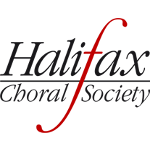Halifax Choral Society
| Halifax Choral Society | |
|---|---|
| Choir | |
 | |
| Origin | Halifax, West Yorkshire, England |
| Founded | 9 February 1818 |
| Founder | William Priestley |
| Genre | Classical Music |
| Members | 99 |
| Music director | John Pryce-Jones |
| Organist | David Houlder |
| Chief conductor | John Pryce-Jones |
| Headquarters | Halifax |
| Influences | Oratorio |
| Website |
www |
Halifax Choral Society is an internationally famous choir based in the town of Halifax in the English county of West Yorkshire. It is notable for being the oldest amateur choral society in Britain (and possibly in the world), founded in 1817 with an unbroken record of performance.
The idea for the Halifax Choral Society (initially called Halifax Quarterly Choral Society) was first mooted in 1817 by founder William Priestley, an eminent local musician, antiquary and literary gentleman. Late in 1817, at a dinner party with his musical friends at his home Crow Trees in Lightcliffe, Halifax, Priestley discussed the possibility of a permanent choir rather than the gatherings of singers that had presented concerts in the district for many years previously. The first performance of the newly formed Halifax Choral Society took place on 9 February 1818 in the Halifax Court House, and was a performance of Haydn’s "The Creation".
The choir has played an important role in the social and musical life of Halifax throughout its life, especially during the many civic and national celebrations which typified Imperial Britain in the nineteenth century. The twentieth century brought the choir the major challenges of keeping going through two world wars, and the challenges of the advent of radio, TV, and the gramophone and its descendants, all of which were new avenues for the Choral Society to explore and use to reach new audiences.
As well as performing with professional orchestras and top ranking soloists, it performs with the highest ranking brass bands such as the world-famous Black Dyke Band from Queensbury, just up the road from Halifax. The choir maintains a friendly rivalry with the choral society of neighbouring town Huddersfield. This may be due in part to the Halifax Choral Society interviewing and turning down of the young Malcolm Sargent for the post of conductor, and then later seeing Sargent's enormous success as conductor of that eminent choir 'over the hill' in Huddersfield.
Imaginative programming over the years has meant the Halifax Choral Society has pioneered music by such composers as Mendelssohn and Haydn, whose oratorio 'The Seasons' is believed to have been premiered in the UK by the HCS. Works have also been commissioned especially for the HCS.
The Halifax Choral Society is currently preparing for its bicentenary season in 2017–18 with a very special season's programme and a new innovative oratorio commission which will feature the story of the life and dramatic death of Halifax’s patron saint – John the Baptist, whose head is to be seen on the Halifax Coat of Arms and is the saint to whom the medieval parish church, now a Minster Church, is dedicated.
Mozart manuscript
The Choir made world headlines when it presented for the first time in modern history the fascinating lost Mozart orchestration of Handel’s Judas Maccabaeus, a major coup for the Choir as the score was found in the HCS archives where it had been preserved since the early 1850s after it was presented to the HCS by the Choir’s founder.[1] This find brought about a TV broadcast of the first performance, seen both in the UK and USA.